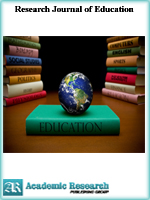Research Journal of Education
Online ISSN: 2413-0540
Print ISSN: 2413-8886
Print ISSN: 2413-8886
Quarterly Published (4 Issues Per Year)

Archives
Volume 6 Number 4 April 2020
Secondary Teachers and Creativity in Teaching: Conceptions and Practices
Authors: Maria Mamoura ; Aglaia Raftopoulou
Pages: 31-38
DOI: doi.org/10.32861/rje.64.31.38
Abstract
In recent years, there seems to be a sharp shift towards the concept of creativity in education. Given that many theorists and researchers find it difficult to define the concept of creativity itself, this paper will attempt to investigate a) the conceptions about creativity in teaching of 5 teachers of humanistic subjects (Modern Greek Language, Ancient Greek Language, History, Greek Literature) in Greek secondary education b) how these specific conceptions are reflected in their teaching practices and c) the degree to which certain teaching strategies that seem to better facilitate creativity in teaching. The research data were collected from five (5) interviews, transcripts and worksheets of ten (10) teachings including field notes. Data were analyzed by the method of grounded theory. Data analysis showed that the emphasis is placed on "creative teaching" rather than on "teaching in order to develop student’s creativity", as distinguished by Jeffrey and Craft. The most important finding of the research is that despite their good intentions or stated open perceptions, the research subjects do not systematically promote students’ creativity unless they abandon their regulatory role and leave a genuine space of self-efficacy to their students. The authors conclude that further research is needed to answer the following questions: why is the model of creative teacher dominant and not that of the teaching that promotes students’ creativity and in what extent and in which ways is creativity defined by specific cognitive subjects.
Implementation of Grade 8 Science Curriculum in Bangladesh: Teachers’ Class Performances
Authors: Mohammed Zakir Hossain
Pages: 25-30
DOI: doi.org/10.32861/rje.64.25.30
Abstract
A mixed method research design was employed to assess the science teachers’ class performance in contrast to the requirements of Science Curriculum 2012 at Grade 8. The population of this study was the Grade 8 Science teachers. Survey questionnaire, semi-structured interview schedule and observation checklist were used. Descriptive statistics and inferential statistics were employed for data analysis. Thematic categories for commonalities were used and coding was done. Teachers have serious limitations in understanding Grade 8 Science curriculum and in applying its instructions in the learning process. Lecture being the principal method used was in delivering lesson. Teaching practice indicated that teachers entered the classrooms without adequate preparation. Most of teachers readout the textbooks. Teachers’ readiness and school’s preparation should be made before the implementation of new education program. There should be policy guideline to develop professionalism among teachers. Training should be designed and conducted on the basis of teacher’s needs.



